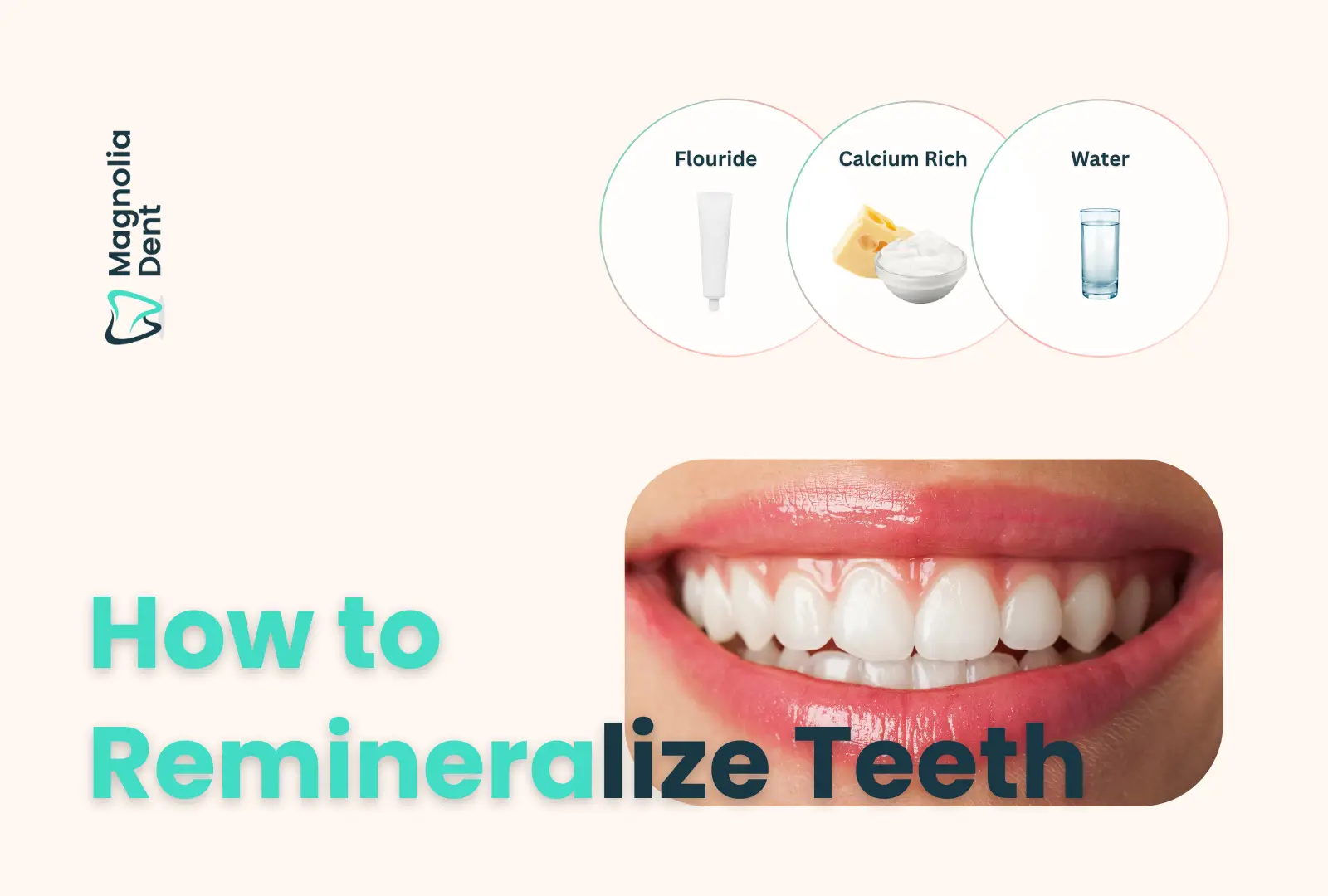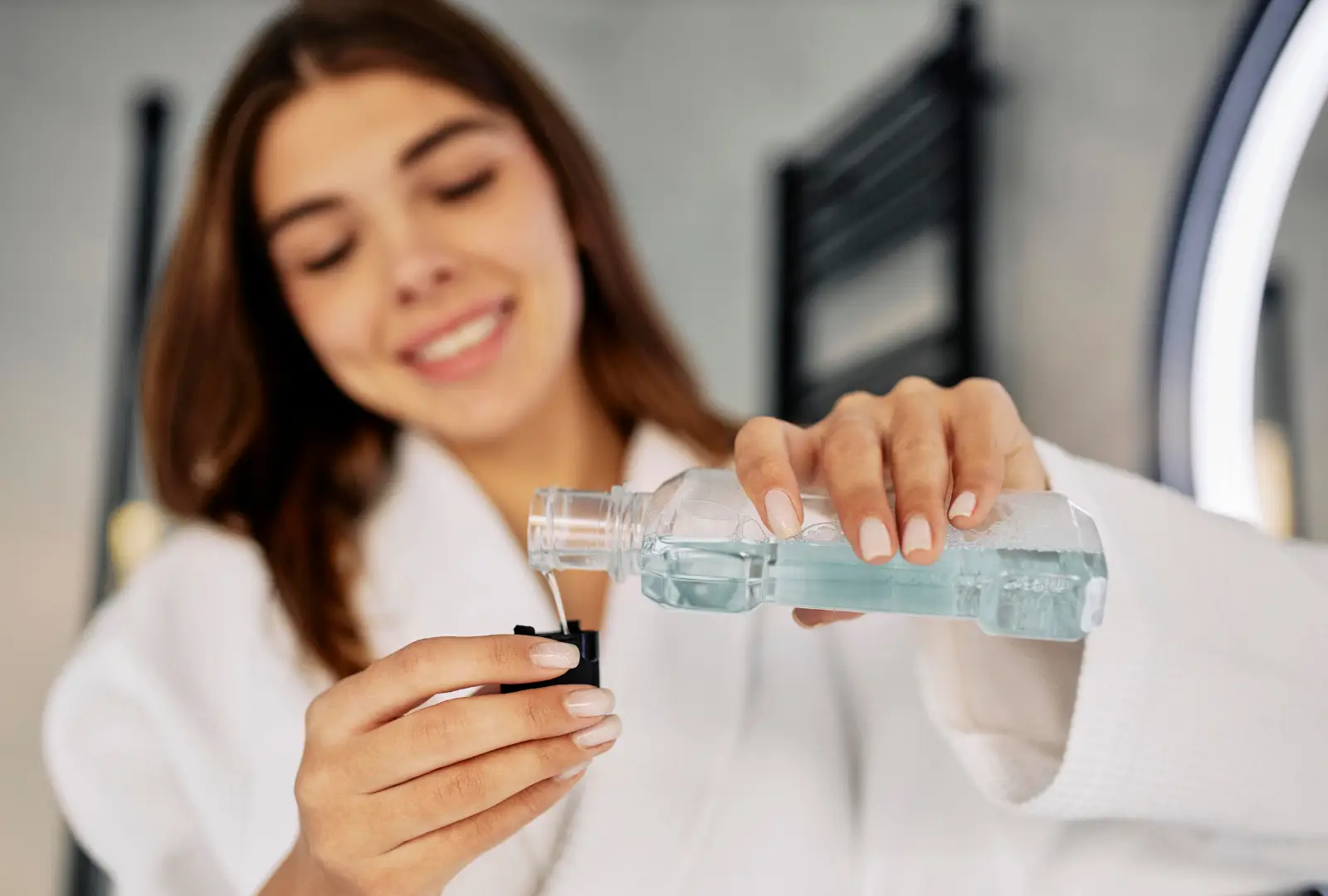
Did you know that your teeth, like your skin and muscles, have the ability to heal? But unlike other parts of your body, they can’t fully regenerate. This is why learning how to remineralize teeth is essential for maintaining strong, healthy enamel.
Over time, your teeth lose important minerals due to exposure to acids in food, drinks, and even your own saliva. This erosion can weaken enamel, causing sensitivity and increasing the risk of cavities. But the good news is, remineralizing teeth naturally is possible, and you don’t need to rely on harsh chemicals or expensive treatments. Instead, simple and effective methods can help you restore the vital minerals your teeth need.
In this guide, we’ll cover how to remineralize teeth naturally using proven, natural methods that help rebuild enamel and protect your smile. Whether you’re struggling with enamel erosion or just want to learn how to maintain your teeth in the best possible way, these practical tips will guide you on the path to healthier, stronger teeth.
| Key Takeaways Remineralization is the process through which minerals are restored to your teeth, making enamel stronger and less prone to decay. Tooth enamel cannot regenerate fully, but remineralization can slow down or reverse early damage to it. Fluoride plays a crucial role in the remineralization process by attracting essential minerals like calcium and phosphate to the enamel. A healthy diet rich in minerals and vitamins can aid remineralization, with calcium, phosphorus, and vitamin D being particularly beneficial. Saliva plays a significant role in remineralization by neutralizing acids and providing minerals that help rebuild enamel. Regular use of remineralizing toothpaste can support the process, but it’s important to maintain good oral hygiene practices overall to achieve the best results. |
Can you remineralize teeth?

Yes, you can remineralize teeth, but it depends on how much enamel damage has already occurred. Enamel doesn’t grow back once it’s gone, but you can help restore lost minerals through natural processes. The goal is to strengthen your existing enamel by replenishing the minerals that protect your teeth.
Remineralization is most effective when enamel erosion is in the early stages. If your enamel is severely worn down, professional dental treatments may be necessary to restore its strength. However, you can support the natural repair process with the right habits and products, such as fluoride toothpaste or remineralizing gum.
Dr. Jane Doe, a dentist specializing in restorative care, explains:
“While enamel can remineralize naturally through the absorption of essential minerals like calcium and phosphate, it’s important to understand that enamel doesn’t regenerate once it’s gone. The process of remineralization strengthens existing enamel, but if the enamel is severely eroded, professional treatments will be required to restore its strength.”
7 Proven Methods to Remineralize Teeth
If you’re looking for ways how to remineralize teeth naturally, there are several methods you can use that are simple and effective. Whether you’re dealing with early enamel erosion or just want to maintain strong, healthy teeth, these proven strategies can help. Here’s how to remineralize teeth and restore your enamel without expensive treatments.
Method 1: Use Fluoride Toothpaste

One of the most effective ways to remineralize teeth is using fluoride toothpaste. According to a study, fluoride has a well-documented ability to promote remineralization by enhancing the uptake of calcium and phosphate ions into the enamel. Fluoride strengthens enamel and makes it more resistant to the damaging effects of acids.
Why it works:
- Fluoride helps repair early enamel damage.
- It strengthens enamel, making it more resistant to acids.
- It can reverse the effects of mild erosion if used consistently.
Choose remineralizing toothpaste or products with fluoride to get the best results in protecting and restoring enamel.
Method 2: Eat Tooth-Healthy Foods
What you eat directly affects your teeth. Consuming the right foods can help remineralize teeth naturally by providing your enamel with the essential nutrients it needs for repair and strength. A study has shown that a balanced diet is crucial for maintaining tooth health and promoting remineralization.
Foods that help:
- Calcium-rich foods: Dairy, leafy greens, almonds
- Phosphorus-rich foods: Meat, eggs, fish
- Vitamin D: Fish, fortified foods, sunlight exposure
Eating these tooth-healthy foods can support enamel restoration and help you remineralize teeth naturally over time.
Method 3: Drink Water with Fluoride
Drinking water with fluoride is another easy way to remineralize teeth naturally. Studies, including one from the Centers for Disease Control and Prevention (CDC), have shown that fluoride in drinking water helps to reduce tooth decay by strengthening enamel and promoting remineralization.
Why it works:
- Fluoride in drinking water helps protect enamel from decay.
- It aids in mineral uptake, promoting enamel repair.
Tip: If you don’t have access to fluoridated water, consider using fluoride toothpaste or treatments at your dentist to support your enamel health.
Method 4: Try Calcium Phosphate Pastes
Calcium phosphate is a mineral that plays a key role in remineralization. Studies show that topical calcium phosphate applications, like pastes or gels, can help restore lost minerals to the enamel. A study found that calcium phosphate significantly supports enamel restoration.
Why it works:
- Calcium phosphate helps restore lost minerals in the enamel.
- It works well in combination with fluoride to enhance remineralization.
Look for calcium phosphate pastes or gels, available in both over-the-counter and professional oral care products.
Method 5: Oil Pulling with Coconut Oil
Oil pulling, a traditional oral hygiene practice, involves swishing oil around in the mouth to promote oral health. While the scientific research is still developing, a study found that oil pulling with coconut oil could reduce harmful bacteria in the mouth, contributing to better oral health.
How it helps:
- Coconut oil has antimicrobial properties that help reduce bacteria in the mouth, allowing the enamel to stay cleaner and support remineralization.
- Oil pulling also promotes gum health, which is closely linked to enamel health.
How to do it:
Swish a tablespoon of coconut oil around in your mouth for 10-15 minutes before spitting it out.
Method 6: Limit Sugary and Acidic Foods
Sugar and acidic foods are major contributors to enamel erosion. To remineralize teeth effectively, it’s crucial to reduce your intake of these harmful foods. According to the American Dental Association, sugary snacks and acidic beverages are the leading causes of tooth decay.
What to avoid:
- Sugary snacks: Candy, soda, pastries
- Acidic foods: Citrus fruits, vinegar-based dressings, wine
Tip: After consuming sugary or acidic foods, rinse your mouth with water to neutralize acids and prevent enamel damage.
Method 7: Use a Remineralizing Mouthwash

Certain mouthwashes are formulated with fluoride, calcium, or phosphate to help remineralize teeth. These mouthwashes have been shown to provide additional support for enamel strengthening in combination with regular brushing and flossing.
Why it works:
- Mouthwashes with fluoride help strengthen and protect enamel.
- They often contain other minerals, like calcium or phosphate, to support remineralization.
Tip: Use mouthwash with fluoride and remineralizing ingredients after brushing to maximize enamel repair.
The Role of Saliva in Tooth Remineralization
Saliva is your body’s natural defense mechanism when it comes to enamel remineralization. It not only neutralizes acids in the mouth but also supplies essential minerals like calcium and phosphate, which aid in the remineralization process. But did you know that boosting your saliva flow can help speed up the process?
Dr. Emily Smith, a specialist in oral health, advises:
“Saliva is your body’s natural defense against enamel erosion. To help your teeth remineralize, stay hydrated and chew sugar-free gum to encourage saliva production. These simple steps can significantly support the natural healing of your enamel.”
How to boost saliva production:
- Stay hydrated throughout the day.
- Chew sugar-free gum to stimulate saliva flow.
- Avoid medications that reduce saliva production.
By boosting your saliva production, you can help your teeth remineralize naturally and maintain enamel strength.
When to Seek Professional Help
While many natural methods can help remineralize teeth, it’s important to know when home remedies and diet changes may no longer be sufficient. Severe enamel damage can lead to tooth sensitivity, increased risk of cavities, and visible erosion. If you notice any of the following signs, it might be time to seek professional help:
- Increased tooth sensitivity to hot, cold, or sugary foods
- Visible thinning or discoloration of the enamel, often leading to a yellowish tint
- Frequent cavities or spots that appear as soft, eroded areas
- Chronic tooth pain, which may be a result of deeper enamel erosion
If home remedies are no longer enough, here are some professional treatments to consider:
- Fluoride Varnishes: Applied by your dentist, fluoride varnishes are a highly effective way to promote remineralization. They help reinforce enamel and protect against further erosion.
- Sealants: These protective coatings can shield vulnerable enamel from further wear and damage, especially in hard-to-reach areas like the molars.
- Professional Care for Deeper Enamel Repair: If enamel erosion is severe, treatments like dental bonding or crowns may be required to restore the tooth’s structure and function.
Ready to take your enamel health to the next level? Schedule your dental checkup today and start your journey toward stronger, healthier teeth!
Frequently Asked Questions
How long does it take for teeth to remineralize naturally?
The time it takes to remineralize teeth varies depending on the extent of enamel damage and the methods you use. Generally, it can take several weeks to a few months for noticeable changes. Consistently using fluoride toothpaste, eating tooth-friendly foods, and maintaining good oral hygiene will speed up the process. However, severe enamel erosion may require professional treatments to see significant improvement.
Can oil pulling help remineralize teeth?
Oil pulling, especially with coconut oil, can promote oral health by reducing harmful bacteria in the mouth. While it doesn’t directly remineralize your teeth, oil pulling helps support overall oral hygiene, which is beneficial in preventing further enamel erosion. It’s most effective when used as part of a broader oral care routine.
Is baking soda effective for remineralizing teeth?
Baking soda can help with surface-level cleaning, removing plaque and stains, but it does not actually remineralize teeth. It’s mildly abrasive and can help with the aesthetic appearance of your teeth, but it’s not a treatment for restoring enamel. It’s best used occasionally to complement other remineralization methods.
How can I tell if my teeth are remineralizing?
You’ll know your teeth are remineralizing when you experience less sensitivity, especially to hot and cold foods, and when your enamel appears less worn or discolored. As the remineralization process progresses, you may also notice a reduction in the visible softness or chalkiness of affected areas. Consistent use of remineralizing toothpaste and a diet rich in enamel-supporting nutrients can help accelerate this process.
Which drinks help remineralize teeth?
Fluoridated water is one of the best drinks for remineralizing teeth. It helps strengthen enamel and neutralizes acids in the mouth. Other beverages like green tea (which contains fluoride) and milk (rich in calcium) also support enamel health. However, you should avoid sugary or acidic drinks, like soda, which can contribute to enamel erosion.
What remineralizes teeth?
Fluoride, calcium, and phosphate are key minerals that help remineralize teeth. Fluoride strengthens enamel, while calcium and phosphate restore lost minerals, supporting tooth health.
How to restore tooth enamel naturally?
To restore enamel naturally, use fluoride toothpaste, eat calcium-rich foods, drink fluoridated water, and avoid sugary or acidic foods that can cause enamel erosion.
